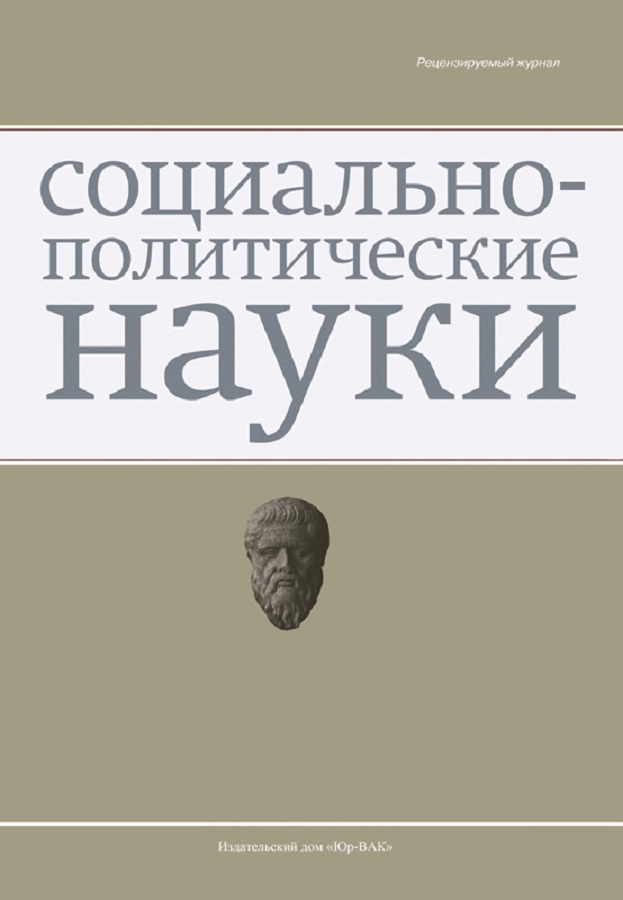To the Question of the Problem of Defining the Concept of “Planetarism” as a New Religious Movement Within the Framework of the Internal Ideological Policy of the State
- Авторлар: Nikolaev N.P.1
-
Мекемелер:
- State Duma of the Federation Council of the Russian Federation
- Шығарылым: Том 13, № 4 (2023)
- Беттер: 166-172
- Бөлім: Controversial political issues from the point of view of the modern perspectives
- URL: https://journals.eco-vector.com/2223-0092/article/view/585181
- DOI: https://doi.org/10.33693/2223-0092-2023-13-4-166-172
- ID: 585181
Дәйексөз келтіру
Аннотация
The purpose of the research. The article deals with the problems of defining the concept of «planetarism» as a new religious phenomenon within the framework of the internal ideological policy of the state, influencing the internal political processes of state administration and the nature of international interaction in the foreign policy arena. The change in the content of the concept of “planetarism” in its historical retrospective is analyzed, demonstrating the process of gradual separation of the concept of “planetarism” from the concept of “globalization” into an independent definition. The aim of the study is to formulate our own definition of the concept of “planetarism” as a new religious movement in the ideological context of state policy. This is necessary to determine the main directions of public administration in the context of value confrontation in the international arena, as well as for more effective legislative support for the implementation of the Decree of the President of the Russian Federation dated November 09, 2022 No. 809 “On Approval of the Fundamentals of State Policy for the Preservation and Strengthening of Traditional Russian Spiritual and Moral Values”. The laws of nature, within the framework of the concept of “planetarism”, began to act as a kind of absolute, which became a kind of scale for the ethical assessment of certain social processes and phenomena, which makes it possible to consider “planetarism” as a new form of religious movement. Conclusions. As a result of the study, the author comes to the conclusion that the ongoing socio-political processes reflect changes in the ideological basis of interstate cooperation. The basis of the new ideological orientation, called “planetarism”, is the idea of the planet Earth as a common “home” for all mankind. Within the framework of the “planetarism” concept, the planet acts not just as a common place of residence for all people, but also as an independent superorganism that has its own consciousness and rights along with the rights of the people themselves. The author, emphasizing the dualistic structure of “planetarism”, which includes, on the one hand, cognitive ideas about the unconditional value of the planet and natural laws, and on the other hand, faith in these values and ideas by analogy with religious faith, proposes to consider “planetarism” as a group of non-theistic beliefs, philosophical and ideological ideas that have arisen around the idea of our Planet as a kind of independent superorganism that gave life to all living things, has the ability of reasonable self-regulation in order to maintain life in all its diversity in accordance with the laws established by it.
Негізгі сөздер
Толық мәтін
Авторлар туралы
Nikolai Nikolaev
State Duma of the Federation Council of the Russian Federation
Хат алмасуға жауапты Автор.
Email: org@nikolaevonline.ru
professor, deputy chairman at the Committee on property, land and property relations
Ресей, MoscowӘдебиет тізімі
- Afanasov N.B. Images of modernity in the 21st century: Christian Moraru’s planetarism: A review of Christian Moraru’s book. Philosophy. Journal of the Higher School of Economics. 2019. Vol. III. No. 1. Pp. 299–314. (In Rus.)
- Glebov G.I., Milaeva O.V. Modern international relations. Tutorial. Penza: Published by Penza State University, 2010. 98 p.
- Dugin A.G. Martin Heidegger. Philosophy of another beginning. URL: https://proza.ru/2012/08/22/525 (date of access: 05.06.2003).
- Malthus T.R. Experience on the law of population. Translit. from English. I. Werner (ed.). Moscow: AST, 2023. 256 p.
- Meadows D.H., Meadows D.L., Randers J., Behrens III W.W. The Limits to growth. Translat. from English by A.S. Sarkisova. D.N. Kavtaradze (ed.). Moscow: Published MSU, 1991. 105 p.
- Moiseev N.N. To be or not to be... humanity? Ulyanovsk: Ulyanovsk Printing House, 1999. 288 p.
- Nikolaev N.P. New World Religion. The experience of comparative reflection on planetarism. Moscow: Gorodets, 2023. 472 p.
- Ripple W.J. et al. World scientists’ warning of a climate emergency. URL: https://academic.oup.com/bioscience/article/70/1/8/5610806?login=false (date of accesses: 05.06.2023).
- Furman D.E. Stalin and we from a religious point of view. In: Comprehend the cult of Stalin (Perestroika: glasnost, democracy, socialism). H. Kobo (ed.-comp.). Moscow: Progress, 1989. Pp. 402–429.
- Berry T. The great work: Our way into the future. NY: Published by Bell Tower; Random House, 1999. 224 p.
- Pedersen S. Introduction: Towards a planetarist conception of politics. URL: https://www.academia.edu/38936415/Towards_a_Planetarist_Conception_of_Politics (data of accesses: 25.07.2023).
- Harmony with nature united nations. Dialogues. 2023. Eleventh Interactive Dialogue of the General Assembly on Harmony with Nature. URL: http://harmonywithnatureun.org/dialogue/Yz7VHSNqnn!XtpzsbH0JXDdZU61EvCKV3JbcI4BOLDQ1yNH6kwzutO30Nwz5a8!%20mbAm9rmi3TFGbWxA2f1dbCg== (data of accesses: 19.06.2023).
- Hutton M.D. James Theory of the Earth; with proofs and illustrations. In 4 vols. Vol. 2: Produced by Robert Shimmin, renald levesque and the PG online distributed proofreading team. URL: https://www.gutenberg.org/cache/epub/14179/pg14179-images.html (data of accesses: 05.06.2003).
- Inglehart R. The unexpected decline of religiosity in developed countries. St. Petersburg: Publishing house of the European University in St. Petersburg, 2022. 238 p.
Қосымша файлдар








